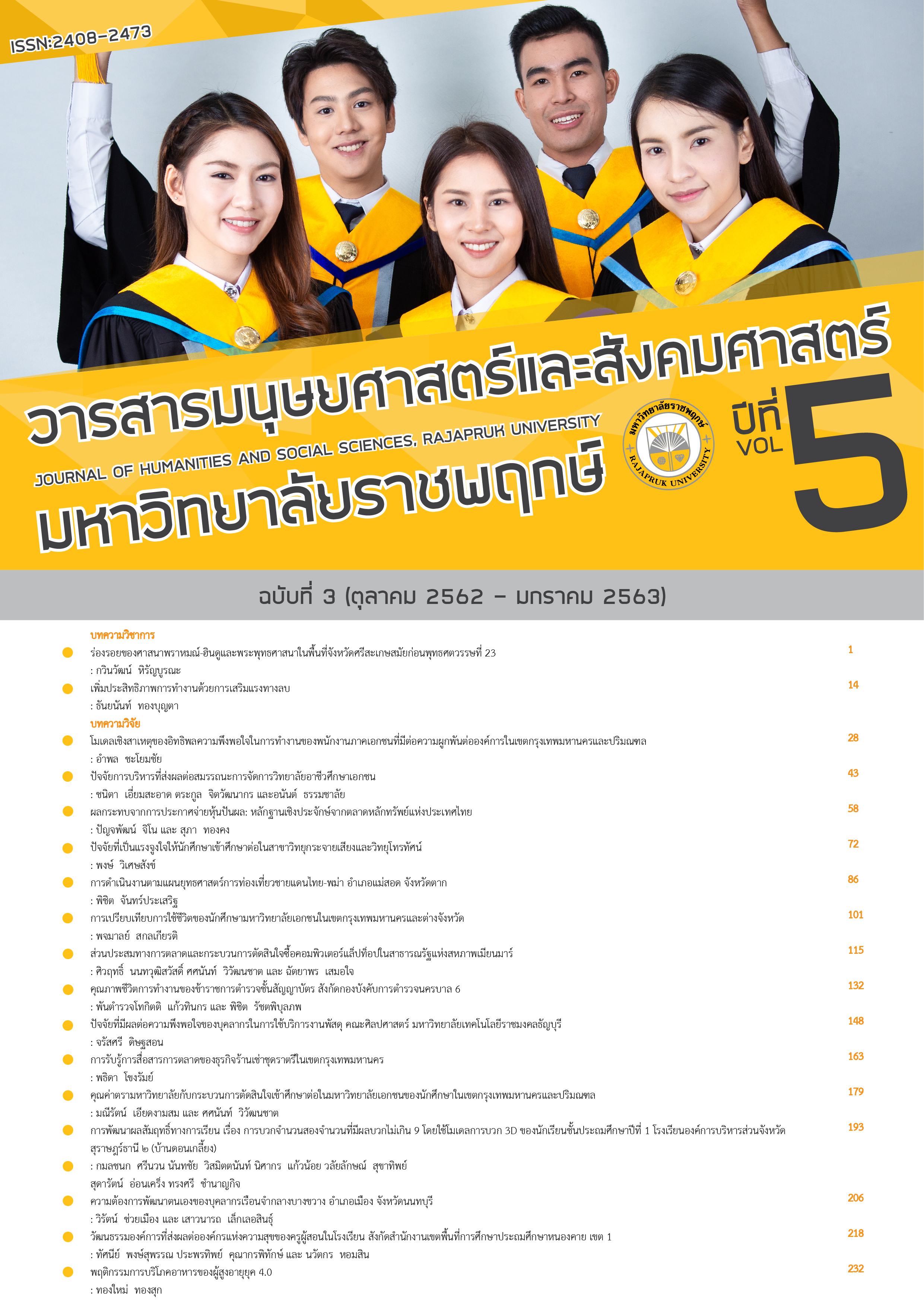Organizational Culture Affecting Happy Workplace of The Teacher in School under Nongkhai Primary Educational Service Area 1
Main Article Content
Abstract
The purposes of this research were to: 1) study the Happy Workplace level of teachers 2) study the Organizational Culture level of teachers 3) study the relationship between Organizational Culture and the Happy Workplace of teachers and 4) to create Forecasting of Organizational Culture affecting Happy Workplace of teachers in schools Under the Nong Khai Primary Educational Service Area 1. The sample group was 316 teachers, using stratified random sampling. The tool is a questionnaire 5 level estimation scale. Data analyzed by frequency, percentage, mean, standard deviation Correlation coefficient And stepwise multiple regression analysis The results of the research were as follows: 1) The Happy Workplace of teachers, in the high level 2) organizational culture factors of teachers, in the high level Statistical significance at the level of .01 and 4) organizational culture factors can predict together the Happy Workplace of teachers, a significant level of .01. Predictive equations below. Forecast equation in general score Y = 1.861 + .387(VAL) + .112(CON) + .099(HER) Equation in the standard score Z = .560(VAL) + .174(CON) + .125(HER)
Article Details
References
ขวัญเมือง แก้วดำเกิง. (2554). องค์กรสุขภาวะกับความรับผิดชอบต่อสังคม. วารสารสุขศึกษา ภาควิชาสุขศึกษาและพฤติกรรมศาสตร์คณะสาธารณสุขศาสตร์ มหาวิทยาลัยมหิดล. 34(3) กันยายน – ธันวาคม 2554: 1 – 8. ค้นเมื่อวันที่ 25 กุมภาพันธ์ 2562, จาก https://www.tci-thaijo.org/index.php/muhed/article/view/173916/124635.
จอมพงศ์ มงคลวานิช. (2555). การบริหารองค์การและบุคลากรทางการศึกษา. กรุงเทพฯ: ทวีพริ้นท์ (1991).
จุฑามาศ แก้วพิจิตร และคณะ. (2556). 123 สู่การเป็นองค์กรแห่งความสุข. กรุงเทพฯ: ศูนย์องค์กรสุขภาวะ (Happy Workplace Center) สำนักงานกองทุนสนับสนุนการสร้างเสริมสุขภาพ.
ชาญวิทย์ วสันต์ธรารัตน์. (2556). มาสร้างองค์กรแห่งความสุขกันเถอะ. กรุงเทพฯ: สำนักงานกองทุนสนับสนุนการสร้างเสริมสุขภาพ.
ไชยยศ เหมะรัชตะ. (2560). คุณธรรม จริยธรรม จรรยาบรรณวิชาชีพ สำหรับอาจารย์ในสถาบัน การศึกษาของรัฐและเอกชน. วารสารมนุษยศาสตร์และสังคมศาสตร์ มหาวิทยาลัยราชพฤกษ์, 3(2) มิถุนายน – กันยายน 2560: 1 - 10. ค้นเมื่อวันที่ 2 กุมภาพันธ์ 2562, จาก https://www.tci-thaijo.org/index.php/rpu/article/view/112577/87687
ณัฏฐภรณ์ หลาวทอง. (2559). การสร้างเครื่องมือการวิจัยทางการศึกษา. กรุงเทพฯ: สํานักพิมพ์แห่งจุฬาลงกรณ์มหาวิทยาลัย.
ทิพย์ศิริ กาญจนวาสี และ ศิริชัย กาญจนวาสี. (2559). วิธีวิทยาการวิจัย. กรุงเทพฯ: ทรีบีการพิมพ์และตรายาง.
นิติพล ภูตะโชติ. (2559). พฤติกรรมองค์การ. พิมพ์ครั้งที่ 3. กรุงเทพฯ: โรงพิมพ์แห่งจุฬาลงกรณ์มหาวิทยาลัย.
ลักษมี มีแก้ว. (2556). งานสร้างสรรค์ของทีมสร้างสุข. สรรสาระองค์กรแห่งความสุข เล่ม 5, กรุงเทพฯ: สำนักงานกองทุนสนับสนุนการสร้างเสริมสุขภาพ (สสส.).
ศิรินันท์ กิตติสุขสถิต และคณะ. (2556). คู่มือการวัดความสุขด้วยตนเอง Happymeter. กรุงเทพฯ: โรงพิมพ์ธรรมดาเพรส.
สำนักงานกองทุนสนับสนุนการสร้างเสริมสุขภาพ (สสส.). (2552). มาสร้างองค์กรแห่งความสุขกันเถอะ. กรุงเทพฯ: สำนักงานกองทุนสนับสนุนการสร้างเสริมสุขภาพ.
สิทธิพร กล้าแข็ง. (2559). งานสร้างสรรค์ของทีมสร้างสุข. สรรสาระองค์กรแห่งความสุข เล่ม 5. กรุงเทพฯ: สำนักงานกองทุนสนับสนุนการสร้างเสริมสุขภาพ (สสส.).
Cameron, K. S., and Quinn, R. E. (1999). Diagnosing and Changing Oraganizational Culture. Massachusetts: Adisorn-Wesley.
Duangchaom, K. (2014). Organizational Culture. Faculty of Education: Maha Sarakham Rajabhat University. (in Thai)
Hemarajata, C. (2017). Ethics, professional ethics For teachers in the Institute Public and private education. Journal of Humanities and Social Sciences Rajapruk University, 3(2) June - September 2017: 1 - 10. Retrieved on 2nd February 2019, from https://www.tci-thaijo.org/index.php/rpu/article/view/112577/87687(in Thai)
Kaewdamkeng, K. (2011). Health and social responsibility organization. Health Education Journal Department of Health Education and Behavioral Science, Faculty of Public Health Mahidol University. 34(3) September – December 2011: 1 – 8. Retrieved on 25th February 2019, from https://www.tci-thaijo.org/index.php/muhed/article/view/173916/124635. (in Thai)
Kaewphichit, J. et al. (2013). 123 to become a happy organization. Bangkok: Enterprise Center Happy Workplace Center Office of Health Promotion Fund. (in Thai)
Kanjanawasi, T. and Kanchanawati, S. (2016). Research methodology. Bangkok: Tree B Printing and Rubber Stamp Company Limited. (in Thai)
Kittisuksathit, S. et al. (2013). A Guide to Measuring Happymeter Self. Bangkok: Plain printing house, Press. (in Thai)
Klakeng, S. (2016). Creative work of the team creating happiness. The content of the organization of happiness, book 5. Bangkok: Office of Health Promotion Foundation (SSO). (in Thai)
Laothong, L. (2016). The creation of educational research tools. Bangkok: Chulalongkorn University Publishing House. (in Thai)
Meekaew, L. (2013). The creative work of the team creates happiness. The content of the organization of happiness, book 5. Bangkok: Office of Health Promotion Foundation (SSO). (in Thai)
Mongkhonvanich, C. (2012). Organization and educational personnel. Bangkok: Thawee Print (1991). (in Thai)
Phutachoti, N. (2016). Organizational Behavior 3 edition. Bangkok: Printing Factory Chulalongkorn University. (in Thai)
Thai Health Promotion Foundation. (2009). Let's create an organization of happiness. Bangkok: Office of the Thai Health Promotion Foundation. (in Thai)
Wasanthararat, C. (2013). Let's create a happy organization. Bangkok: Health Promotion Foundation. (in Thai)


